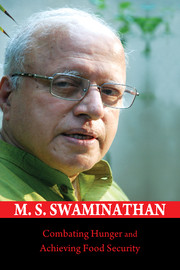Book contents
- Frontmatter
- Contents
- Foreword
- Preface
- Acknowledgements
- Abbreviations
- 1 Genesis and Growth of the Yield Revolution in Wheat
- 2 Our Agricultural Heritage
- 3 Shaping Our Agricultural Destiny
- 4 Thrust on Farm Revival
- 5 Nutri-farm Movement
- 6 Nutrition-sensitive Agriculture
- 7 Food Losses and Food Waste
- 8 Rice in Zero Hunger Challenge
- 9 Monsoon Management
- 10 Importance of Ecological Conservation
- 11 Caring for Ecology and Heritage
- 12 Conserving Biodiversity
- 13 Overcoming Hidden Hunger through Aquaculture
- 14 Biofuels – The Way to Go
- 15 Food Security
- 16 Vigilance for Sustainable Food Security
- 17 Food Security and Social Protection
- 18 Food Security and its Role
- 19 Sustaining the Livestock Revolution
- 20 Challenges in the Year of Science
- 21 Agriculture and Humanism
- 22 Fostering the Science of Science Communication
- 23 Olympic Move for Saving Children
- 24 Youth: The Agents of Change
- 25 Role of Women in Agricultural Production
- 26 Know-how to Do-how
- 27 From Bengal Famine to Right to Food
- 28 Financial Institutions and Fighting Food Inflation
- 29 Public Good Research in Agriculture
- 30 The Future of Indian Agriculture
- Bibliography
20 - Challenges in the Year of Science
Published online by Cambridge University Press: 18 December 2015
- Frontmatter
- Contents
- Foreword
- Preface
- Acknowledgements
- Abbreviations
- 1 Genesis and Growth of the Yield Revolution in Wheat
- 2 Our Agricultural Heritage
- 3 Shaping Our Agricultural Destiny
- 4 Thrust on Farm Revival
- 5 Nutri-farm Movement
- 6 Nutrition-sensitive Agriculture
- 7 Food Losses and Food Waste
- 8 Rice in Zero Hunger Challenge
- 9 Monsoon Management
- 10 Importance of Ecological Conservation
- 11 Caring for Ecology and Heritage
- 12 Conserving Biodiversity
- 13 Overcoming Hidden Hunger through Aquaculture
- 14 Biofuels – The Way to Go
- 15 Food Security
- 16 Vigilance for Sustainable Food Security
- 17 Food Security and Social Protection
- 18 Food Security and its Role
- 19 Sustaining the Livestock Revolution
- 20 Challenges in the Year of Science
- 21 Agriculture and Humanism
- 22 Fostering the Science of Science Communication
- 23 Olympic Move for Saving Children
- 24 Youth: The Agents of Change
- 25 Role of Women in Agricultural Production
- 26 Know-how to Do-how
- 27 From Bengal Famine to Right to Food
- 28 Financial Institutions and Fighting Food Inflation
- 29 Public Good Research in Agriculture
- 30 The Future of Indian Agriculture
- Bibliography
Summary
The year 2012–13 represents the centenary year of the Indian Science Congress Association (ISCA). The focal theme of the centenary session in January 2013 chaired by Prime Minister Manmohan Singh was ‘Science and Shaping India's Future’. The only other Prime Minister who has so far served as the general president of the Indian Science Congress is Jawaharlal Nehru. This historic session was held in 1947 and Nehru then made the oft-quoted statement: ‘The future belongs to science and to those who make friendship with science.’ It is a good augury that the year of science has started with global recognition given to tribal families of the Koraput district of Odisha for the sustainable and climate-resilient farming systems they have developed over the centuries. These families were recognized through the selection of their traditional agricultural system for inclusion under the Globally Important Agricultural Heritage Systems of the FAO. Knowledge is a continuum and therefore we should respect both indigenous knowledge and frontier science. The future of food security will depend on a combination of the ecological prudence of the past and the technological advances of today and tomorrow.
A second area, which deserves attention during the international year of science is harnessing transformational genes and technologies. A good example of a transformational gene is the Norin 10 dwarfing gene in wheat, identified at the Norin Experiment Station, Japan, which enabled the breeding of semi-dwarf varieties like Kalyansona and Sonalika, capable of responding to good soil fertility and moisture content. These varieties helped usher in the wheat revolution in the 1960s. Similar transformational genes have been identified and used in rice, maize and other crops. More recently, genetic engineering technology has helped identify and introduce transformational genes conferring tolerance to salinity, drought and floods.
A recent example of transformational technology is mobile telephony. Artisanal fishery is getting transformed through the application of mobile telephony. Small-scale fishermen going out to sea in catamarans can now leave the shore with information on wave heights at different distances and the location of fish shoals. Earlier they used to spend over 10 hours on sea but they now come back within two hours with good fish catch. Also, the fear of the sea, which they developed after the tsunami of December 2004, has disappeared since they know what the wave heights will be at different distances from the shoreline.
- Type
- Chapter
- Information
- Combating Hunger and Achieving Food Security , pp. 105 - 110Publisher: Cambridge University PressPrint publication year: 2016



